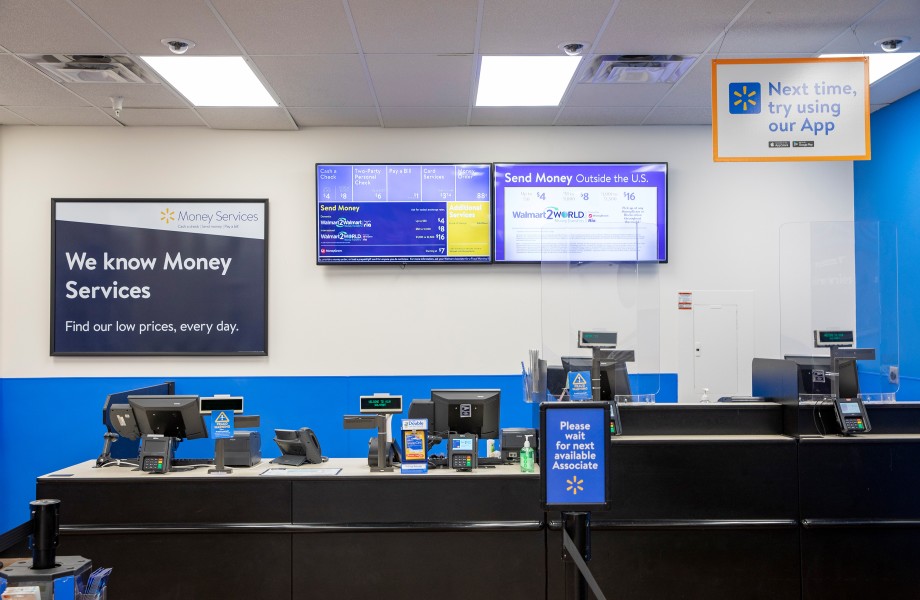Under Scrutiny: FTC Sues Walmart for Facilitating Money Transfer Fraud — Costing Customers Hundreds of Millions
- Walmart has a reputation as a "one-stop" shopping destination
- Toward that end, Walmart offers money transfer services
- Unfortunately, a lawsuit alleges they did not protect these transactions
Walmart has enjoyed a reputation as the "one-stop" center for consumer needs, and, true to their reputation, they expanded into the money transfer space so their customers could handle transactions at the same place they get their milk and potato chips. (In fact, we reported on their entry into the "banking space" last year.)
Walmart offered an impressive suite of services, including money transfers, credit cards, reloadable debit cards, check cashing, bill payments and more. Additionally, Walmart acts as an agent for multiple money transfer services, including MoneyGram, Ria, and Western Union.
Some services are offered under its own brand -- “Walmart2Walmart” and “Walmart2World,” for instance.
Unfortunately, according to the Federal Trade Commission, Walmart was allowing its money transfer services to be used by fraudsters, who fleeced consumers out of hundreds of millions of dollars.
Walmart Under FTC Scrutiny
The complaint states that tens of millions of money transfers are sent or received at Walmart stores each year, where they are processed by Walmart employees. The FTC alleges that for years, the company turned a blind eye while scammers took advantage of money transfer services offered at Walmart stores (super convenient) without proper security in place (super dangerous).
The company did not properly train its employees, failed to warn customers, and used procedures that allowed fraudsters to cash out at its stores, according to the FTC’s complaint. The FTC is asking the court to order Walmart to return money to consumers and to impose civil penalties for Walmart’s violations.
The FTC’s investigation, according to the complaint, revealed that Walmart knew about the role money transfer services play in scams and frauds.
“While scammers used its money transfer services to make off with cash, Walmart looked the other way and pocketed millions in fees,” said Samuel Levine, Director of the FTC’s Bureau of Consumer Protection. “Consumers have lost hundreds of millions, and the Commission is holding Walmart accountable for letting fraudsters fleece its customers.”
Some of Walmart's negligent practices, the suit alleges, include:
In response, Walmart issued a corporate statement on June 28, 2022:
A narrowly divided Federal Trade Commission (“FTC”) brought this factually flawed and legally baseless civil lawsuit after the Chair refused Walmart the due process of hearing directly from the company, and even the Justice Department refused to take this case to court.
Claiming an unprecedented expansion of the FTC’s authority, the agency seeks to blame Walmart for fraud that the agency already attributed to another company while that company was under the federal government’s direct supervision.
Walmart will defend the company’s robust anti-fraud efforts that have helped protect countless consumers, all while Walmart has driven down prices and saved consumers an estimated $6 billion in money transfer fees.
Level Playing Field: Walmart Money Services vs. Banking
As more and more companies delve into banking services, it is only logical that they are required to adhere to the same rules and regulations as banks, right? According to Walmart's website, there are policies and procedures in place, but they are of limited visibility.
However, one thing is for certain -- fraudsters are utilizing their services and lack of safeguards to their advantage.
While Walmart does have the advantage when it comes to convenience, banks still have a stronger reputation when it comes to fraud protection and detection. Banks deploy sophisticated fraud detection technology like AI and machine learning to analyze billions of transactions.
Furthermore, many are taking it a step further by deploying image-forensics AI to interrogate paper-based transactions like check payments to detect counterfeits, forgeries, and alterations. By doing so, banks are able to detect and prevent more fraud, protecting their customers, and -- most importantly -- maintaining their reputations for secure transactions.


